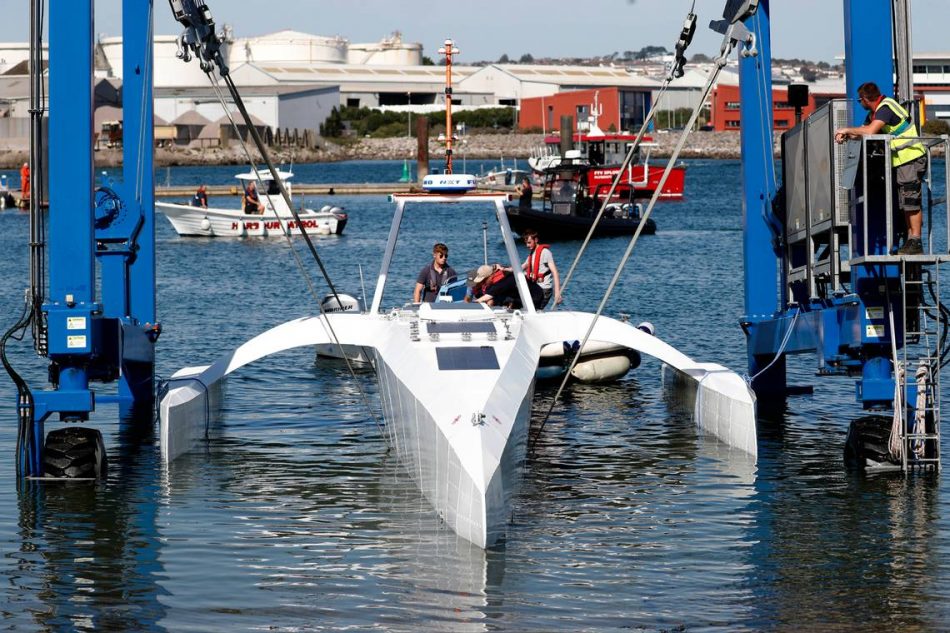Science
From mathematics and AI to medicine and psychology, The Optimist Daily features the latest news on discoveries, technological advances, and breakthroughs in the world of science. Our Science section is here to engage and enlighten you.

Extremely rare “walking” fish discovered in the Great Barrier Reef
After the Schmidt Ocean Institute’s research vessel plunged deep beneath the Pacific Ocean, it came back with a treasure trove of high-resolution footage featuring rare deep-sea creatures. The remote operated vehicle (ROV), which explored Australia’s Great Barrier Reef, spotted and took Read More...

This tool aims to save whale lives by preventing collisions with ships
Collisions with shipping vessels are among the most common cause of death in large whales. Along the West Coast, alone, scientists estimate that ships are responsible for the death of around 80 endangered whales every year. This usually happens due to busy shipping routes overlapping with whale Read More...

Lyft is once again offering free or low-cost rides on Election Day
With the elections coming up, ride-sharing giant Lyft is offering free and discounted rides to help people get to their local polling stations. When election day arrives, riders will be able to get 50 percent off one ride (up to $10) to a dropbox or polling location when you use the code Read More...

How drones and AI can restore degraded ecosystems
Over the last several centuries, humans have felled around 2 billion hectares of forest, leaving behind an area of degraded land comparable to the size of Australia. To restore these ecosystems that are essential in our fight against global warming, we need urgent reforestation efforts that go Read More...

The Mayflower: Robotic vessel will cross Atlantic to gather ocean data
Robotic ships are the latest trend in ocean exploration. In August, we wrote about an automated 12-meter boat that successfully completed a 22-day-long mission to map an area of the seafloor in the Atlantic—without a crew. Today, we bring you news about another robotic vessel that is getting Read More...

Researchers prepare first human trials for a bionic eye
Back in June, we shared a story about a new bionic eye created at Hong Kong University of Science and Technology. Now, a team of researchers and doctors in Australia are preparing for the world’s first human clinical trials of a bionic eye in hopes of soon distributing the innovative technology Read More...

Pineapple leaves can help extend the lifespan of fresh fruit and vegetables
Every year, the world wastes about one-third of all food produced for human consumption, a great amount of which results from inadequate storage and processing facilities for post-harvest produce. Developing technologies that help keep food fresh for longer is one of the most effective ways to save Read More...

Drone exploration discovers large Native American settlement from 1600s
The bird’s eye view from drones gives us a unique perspective on our world. A drone flying over a cattle ranch in Kansas recently made a surprising discovery: the remnants of a large indigenous community built by ancestors of today’s Wichita and Affiliated Tribes. The drone spotted the Read More...

Why passenger planes may soon fly in formation just like birds
Is it a bird? Is it a plane? Soon, it may be hard to tell, as giant aerospace company Airbus has recently come up with a method to save jet fuel that involves having airplanes fly in formation, just like a flock of migrating geese. Inspired by the flight technique of migrating birds, researchers Read More...

Monitoring brainwaves during sleep can pinpoint best antidepressant
One major problem with antidepressants is that patients have to take the drug for at least a month to know whether or not it works. But that could soon change after researchers found a quicker, more effective way to gauge the effectiveness of an antidepressant: monitoring a patient’s brainwaves Read More...


